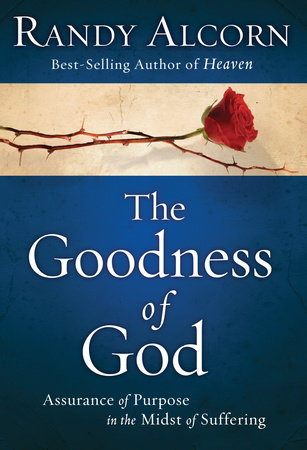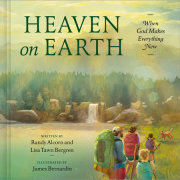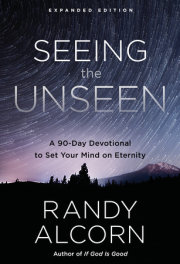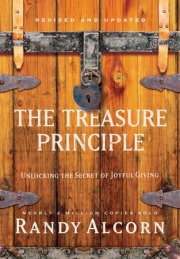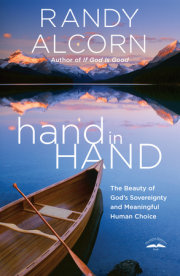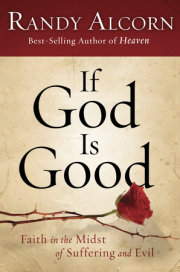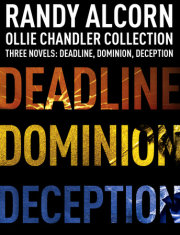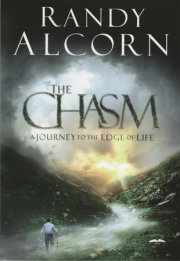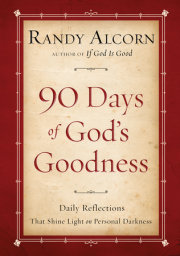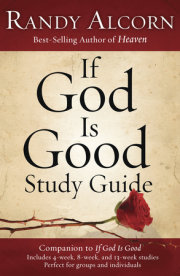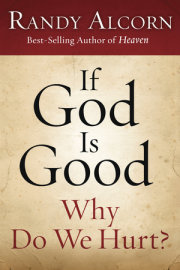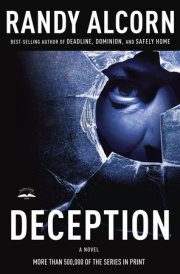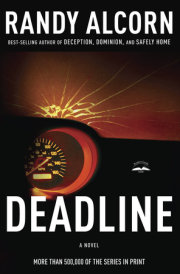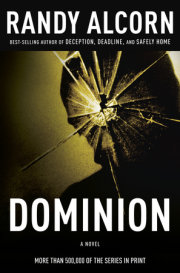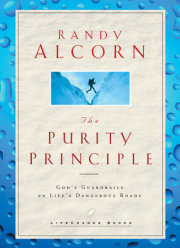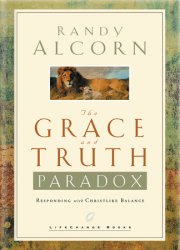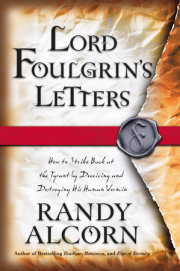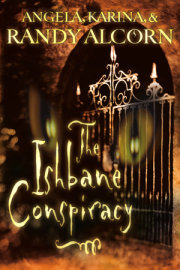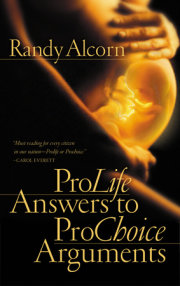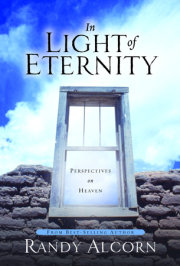Introduction A Search We All ShareDuring the two years it took to research and write my large book
If God Is Good: Faith in the Midst of Suffering and Evil, many people asked me what I was working on. I expected my answer—containing the words
evil and
suffering—would prompt a quick change of subject. Most, however, expressed keen interest and asked penetrating questions. Several launched into their own stories, as if having received permission to uncork the bottle. What, after all, is more universal to human experience than suffering? And what can be more important than the perspective we bring to it?
When It’s Deeply PersonalYou may be looking for answers to a philosophical problem or an intellectual struggle. Or you may be looking less for answers than for hope. When a child has fallen off a bicycle, her father doesn’t give a lecture about nerve endings, skin tissue, and the role of blood as it’s pumped by the heart. He reassures the child that he’s there for her, and “everything will be okay.” For you, the answer may simply be “God really does love me.”
If something like abuse, desertion, debilitating disease, or the loss of a loved one has devastated you, then suffering isn’t theoretical or philosophical. It’s deeply personal.
In writing his magnificent story of redemption, God has revealed truths about himself, us, the world, goodness, evil, suffering, and Heaven and Hell. Those truths teem with life—the blood of man and of God flows through them. God speaks with passion, not indifference. To come to grips with the problem of evil and suffering, you must do more than hear heart-wrenching stories about suffering people. You must hear God’s truth to help you interpret those stories. Maybe you’re holding on to years of bitterness and depression. You blame someone else for your suffering—and that someone may be God. You will not find relief unless you gain perspective. But perhaps you fear that any attempt to “gain perspective” will deny or minimize your suffering, or that of others. I promise you, the Bible doesn’t minimize suffering or gloss over it, and neither will I.
At times, each of us must snuggle into our Father’s arms, like children, and there receive the comfort we need. God doesn’t just offer us advice, he offers us companionship. He doesn’t promise we won’t face hardship, but he does promise he’ll walk with us through our hardship.
THE QuestionA Barna Research poll asked, “If you could ask God only one question and you knew he would give you an answer, what would you ask?” The most common response was, “Why is there pain and suffering in the world?”1 This isn’t merely
a problem; it’s
the problem. And for the culture at large, it appears to pose a greater difficulty now than ever. Unlike the average person in earlier centuries, we today have a far higher assumption and expectation of comfort, health, and prosperity.
When people take time to reflect on life’s meaning in this world, no question looms larger than this one: If God is good…
why all this evil and suffering? If God loves us, how can he justify allowing (or sending) the sometimes overwhelming difficulties we face? How we answer this question will radically affect how we perceive God and
the world around us.
We may want to turn away from the world’s suffering and ignore the significance of our own pain; we just want it to go away. But despite the superficiality of our culture, we remain God’s image-bearers—thinking and caring people, wired to ask questions and seek answers. You won’t get far in a conversation with someone who rejects the
Christian faith before the problem of evil is raised. Atheists such as Richard Dawkins and Christopher Hitchens claim it proves that God doesn’t exist. (Never mind that many who suffer most believe and trust in God, while many who suffer least don’t.) British philosopher Antony Flew, a former champion of atheism, renounced his atheism during the past decade, citing the complexity of the universe and his belief in the overwhelming evidence for intelligent design. Flew did not, however, convert to the Christian faith, but only to deism. Why? He couldn’t get past the problem of evil. He believes God must have created the universe, then abandoned it.
My Own Experiences with SufferingI’m a fellow traveler with you on this road of suffering. In 1970, as a sixteen-year-old new Christian, I watched my friend Greg die from a horrible accident. In 1979, I had to tell my mother that her only brother had been murdered with a meat cleaver. Two years later, Mom died from cancer. About the same time, I was in the throes of an unjust
lawsuit that cost me a job I loved and the ability to earn a normal wage.
In 1992 I was alone with my best friend from childhood when he died from cancer, at age thirty-nine. A few years later—alongside my wife, daughters, and brother—I held my dad’s hand as he died, a shriveled version of the vibrant man I’d known. For twenty-five years I’ve battled a disease that daily affects my body and mind, and will probably shorten my life span. But all in all, if I’ve suffered a little more than some people, I’ve suffered a great deal less than others. And while seeking to understand the huge question
of evil and suffering, I’ve realized my need for a deeper and wider perspective.
Along the way I’ve asked God to give me wisdom—and discovered that wisdom begins with the humility to say, “There’s a great deal about this I don’t understand.” In fact, if I imagined I had all the answers neatly lined up, what I’ve written wouldn’t be worth reading. While researching this subject, I’ve read nearly a hundred books, listened to countless lectures and debates, and interviewed dozens of people who have faced great evil and suffering. That probably doesn’t sound like fun, yet I found something surprising: the journey was not only rewarding, but also fascinating, enlightening, and at times downright enjoyable. I know it sounds counterintuitive—shouldn’t meditating on evil and suffering be
depressing? In fact, I’d already seen enough evil and suffering to feel deeply troubled. What I needed was
perspective. In my search for answers, I’ve beheld the God who says, “I have indeed seen the misery of my people.… I have heard them crying out…and I am concerned about their suffering” (Exodus 3:7). I revel in God’s emphatic promise in the Bible that he will make a New Earth where he’ll come down to live with his people, where “he will wipe every tear from their eyes,” and “there will be no more death or mourning or crying or pain” (Revelation 21:4).
Often, as I’ve contemplated potentially faith-jarring situations, God has wiped away my own tears as I’ve sought his truth. While my journey hasn’t unearthed easy answers, I’m astonished at how much insight the Bible offers on this most troubling of all subjects. And after much wrestling with the issues, instead of being disheartened, I’m encouraged—especially from seeing so much of God’s goodness, love, holiness, justice, patience, grace, and mercy. This journey has stretched my trust in God and his purposes,
and I’ve emerged better prepared to face suffering and to help others who suffer. I feel I have much more to offer believers in Christ who may be questioning their faith, as well as unbelievers who consider the problem of evil and suffering their single greatest obstacle to faith. With that in mind, I invite you to join me on this journey that I’ve found so interesting, enlightening, and ultimately comforting.
When Losing Faith Is GOODEvil and suffering have a way of exposing our inadequate theology. When affliction comes, a weak or nominal Christian often discovers that his faith doesn’t account for it or prepare him for it. His faith has been in his church, denomination, or family tradition, or in his own religious ideas—but not in Christ. As he faces evil and suffering, he may, in fact, lose his faith.
But that’s actually a good thing; any faith that leaves us unprepared for suffering is a false faith that deserves to be abandoned. Genuine faith will be tested by suffering; false faith will be lost—the sooner, the better.
Believing God exists isn’t the same as
trusting the God who exists. If you base your faith on lack of affliction, your faith lives on the brink of extinction and will fall apart because of a frightening diagnosis or a shattering phone call. As John Piper writes, “Wimpy Christians won’t survive the days ahead.”2
Only when you jettison ungrounded and untrue faith can you replace it with valid faith in the true God—faith that can pass, and even find strength in, the most formidable of life’s tests. Unfortunately, most churches have failed to teach people to think biblically about the realities of evil and suffering. A pastor’s daughter told me, “I was never taught the Christian life was going to be difficult. I’ve discovered it is, and I wasn’t ready.”
Our failure to teach a biblical theology of suffering leaves Christians unprepared for harsh realities. It also leaves our children vulnerable to history, philosophy, and global studies classes that raise the problems of evil and suffering while denying the Christian worldview. Since the question
will in fact be raised, shouldn’t Christian parents and churches raise it first and take people to Scripture to see what God says about it?
No Quick FixYou’ll notice in these pages that I frequently quote Scripture. I do so because God promises that his Word “will not return to me empty, but will accomplish what I desire and achieve the purpose for which I sent it” (Isaiah 55:11). God never makes this promise about my words or yours. That’s why I’m convinced that this book can accomplish God’s purpose only if it remains faithful to his words. As you read along, I urge you not to let your feelings—real as they are—invalidate your need to let the truth of God’s words guide your thinking. Remember that the path to your heart travels through your mind.
Truth matters. So as you deal with suffering, by all means speak with a friend or pastor or counselor, or join a support group. Do not, however, ignore truth in the process. Quick-fix feelings will never sustain you over the long haul. But deeply rooted beliefs—grounded in Scripture—will allow you to persevere and hold on to a faith built on the solid rock of God’s truth.
Drenched in his own tears, the prophet Habakkuk said,
How long, O LORD, must I call for help,
but you do not listen?
Or cry out to you, “Violence!”
but you do not save?
Why do you make me look at injustice?
Why do you tolerate wrong? (1:2–3)
By including this and many similar laments in his inspired Word, God graciously invites our cries—so long as we remain willing to listen to his response. The root issue behind Habakkuk’s cry—and behind our own similar questioning—is a problem that people have expressed in various ways, with different nuances. I’ll state it this way: If God is all-good and all-knowing and all-powerful, why is there so much evil and suffering in the world? Surely he wants to prevent it, knows how to prevent it, and has the ability to prevent it. So why doesn’t he?
Notes1. Lee Strobel,
The Case for Faith (Grand Rapids, MI: Zondervan, 2000), 29.
2. John Piper,
Spectacular Sins (Wheaton, IL: Good News, 2008), 57.
Chapter 1 Tragic Choices Determining the Originsof Evil and Suffering His teenage son had died three months earlier. Randy Butler was a pastor I met while teaching a seminary course on the theology of Heaven. After the class, he said, “For twenty years, God gave me a perfect life, family, and ministry. Then Kevin died, and
nearly every morning, for three or four months, I screamed questions at God:
What were you thinking?… Is this the best you can do for me?… Do you really expect me to show up every Sunday and tell everyone how great you are? “In the silence I began to hear the voice of God…then, without any announcement, when I became silent, God spoke to my soul. He had an answer for each of my three questions.”
Had Randy not been painfully honest with God, he might never have come to such an understanding. He might never have realized that he wasn’t the first father to watch his son die. More than anyone in the universe, God understood Randy’s pain—because he had endured the death of his own Son.
God knows it and we know it—
things are not all right with the world. But what does that mean?
Why Evil Is EvilThe pain of suffering points to something deeply and unacceptably flawed about this world we inhabit. We instinctively sense a link between suffering and evil. But how do we explain it?
Evil is a fundamental departure from goodness. The Bible uses the word
evil to describe anything that violates God’s moral will. The first human evil occurred when Eve and Adam disobeyed God. From that first sin—a moral evil—came the consequence of suffering. Moral evil includes blatant wickedness that admits its hatred for goodness, and subtle malevolence that professes to love goodness while violating it.
Whenever we attempt to liberate ourselves from God’s standards and replace them with our own, we not only deny God but affirm ourselves as god. We commit the idolatry of self. Evildoers not only reject God’s Law and create their own, they often attempt to take the moral high ground by calling God’s standards “unloving,” “intolerant,” and “evil.”
Most people today understand evil as anything that harms others; the more harm done, the more evil the action. The Bible uses the word
evil in a broader way to describe anything that flows not from loving God but rebelling against him.
This evil is more than merely the absence of good, though some people view it that way—just as darkness is the absence of light, and death is the taking away of life. New Testament vocabulary can sometimes support this concept, in words such as
unrighteous,
unjust,
ungodly, law
less, and god
less. These suggest that we best understand evil as a departure from God’s goodness. However, while this definition contains helpful insights, it doesn’t go far enough.
The Holocaust was not “nothing.” The Killing Fields were not “nothing.” The 9/11 attacks were not “nothing.” All were real horrors, down to every emaciated corpse, bullet-riddled body, and person jumping out a window.
Evil cannot exist without the good it opposes. It’s not so much the removal of good as it is the
corruption of good. As metal does not need rust, but rust needs metal, so good doesn’t need evil, but evil needs good.
We can think of evil as a parasite on God’s good creation. Without the living organism it uses as a host, the parasite cannot exist. Likewise, cancer thrives on, consumes, and ultimately kills healthy, living cells. Evil’s corruption eats away at everything around it.
We see this most tragically in Genesis 3, when the first human evil occurred as Eve and Adam disobeyed God. That first sin unloosed the ever-expanding consequences of suffering. So suffering follows evil as a caboose follows an engine.
As the moral evil of rebellion against God breeds suffering everywhere, these resulting calamities and tragic events are sometimes also referred to in Scripture as evils themselves. We can therefore think of two kinds of evil—moral wrongdoing as
primary evil, and suffering as
secondary evil. Primary evils are things
we do that
God doesn’t like;
they’re the cause of secondary evils, which are things that happen
to us that
we don’t like.
As the direct and indirect consequences of primary evil, secondary evil provokes our indignation:
why do innocent people suffer? However, by pointing to primary evil, secondary evils remind us that sinful humanity deserves suffering.
As humans, we all stand guilty. Although many secondary evils befall us even when we have not directly committed a sin that causes them, we would not have to deal with secondary evils if we didn’t belong to a sinful race.
Short-term suffering serves as a warning and a foretaste of eternal suffering. Without a taste of Hell, we would not see its horrors nor feel much motivation to do everything possible to avoid it. Hence, the secondary evil of suffering can get our attention and
prompt us to repent of our primary moral evil.
But how did such a terrible situation come about in the first place?
How the Rebellion BeganThe evil of rebellion against God is something that entered the universe through Satan, then through the fallen angels. It’s misleading to say, “God created Satan and demons.” Rather, God created Lucifer and other righteous angels, who later chose to rebel against God, and in so doing
became Satan and demons. The great archangel who rebelled against his Creator is called the devil (which means “slanderer”) and Satan (“accuser”). Jesus called him “a liar and the father of lies” and a “murderer from the beginning” ( John 8:44). Christ also referred to him as “the evil one” (Matthew 13:19) and “the prince of this world” ( John 12:31; 14:30; 16:11).
Satan and the demons dreamed of having authority over themselves and exalting themselves above God. They sinned by desiring to have more power than God had appointed to them. Satan’s work is evil and suffering, and that’s exactly what the
Messiah came to ultimately defeat: “The reason the Son of God appeared was to destroy the devil’s work” (1 John 3:8). From the beginning, God planned that his Son should deal the death blow to Satan, evil, and suffering—reversing the Curse triggered by Adam
and Eve’s sin, redeeming a fallen humanity, and repairing a broken world.
Who Is God’s Equal?As Satan instigates evil and suffering in our lives, we must remember that he is not God’s opposite; the two are not fighting a cosmic duel with an uncertain outcome.
When asked to name the opposite of God, people often answer, “Satan.” But that’s false. Michael, the righteous archangel, is Satan’s opposite. Satan is finite; God is infinite. God has no equal.
It’s true that Satan and demons have great power, and we dare not underestimate it. Satan inflicts evil and suffering on both the world and God’s people. He’s like “a roaring lion looking for someone to devour” (1 Peter 5:8).
But Satan poses no threat to God. Therefore we’re told, “Submit yourselves…to God. Resist the devil, and he will flee from you” ( James 4:7). We should never quote the last part of that verse without the first:
submit yourselves to God. That alone is the basis upon which we, who are no match for Satan, can successfully resist him.
It shouldn’t surprise us when Satan uses evil and suffering—the very things he specializes in—to get us to question God’s goodness, love, power, or knowledge. His purpose in all he does is to keep us from trusting our Savior. Just as he did with Eve, he wants us to question God’s Word: “Did God
really say that?”
Satan’s attacks on us, however, are only within God’s set limits. Jesus said to Peter, “Satan demanded to have you, that he might sift you like wheat” (Luke 22:31, ESV). The devil sought to destroy Peter’s faith, but he could bring into Peter’s life only what the all-knowing and all-powerful God gave him permission to bring. God has veto power over Satan. Satan is a lion seeking to devour us, yet he remains a lion on God’s leash. One day we’ll each learn how many times God refused Satan’s requests to bring greater temptations and hardships upon us.
Although the Bible points to Satan and the fallen angels as the entry of evil into our universe, evil’s ultimate origin remains a mystery. Scripture addresses
when evil came into being, but not
how. Deuteronomy 29:29 seems to apply here: “The secret things belong to the LORD our God.” He has chosen to remain silent on this question, which may itself be significant. If evil is irrational, how can its point of origin be rationally explained? Perhaps God doesn’t offer any explanation because evil defies explanation. It might make sense to an all-knowing God but no sense at all to us.
What’s easier for us to understand is the account of how Adam and Eve fell after being tempted by an evil being.
Where Our Pain BeganAfter God declared his creation “very good,” he gave Adam and Eve these instructions: “You are free to eat from any tree in the garden; but you must not eat from the tree of the knowledge of good and evil, for when you eat of it you will surely die” (Genesis 1:31;
2:16–17).
Even with this clear warning, the first human couple weighed their alternatives, and evil somehow entered their hearts. Adam and Eve rebelled, choosing to violate God’s explicit command. They ate what was forbidden. The Curse fell upon them, their pain greatly increased, the Earth became a world of hurt, and they forfeited paradise.
Grievous as it was, Adam and Eve’s sin did not take God by surprise. Though evil had no part in God’s original creation, it was fully anticipated in his original plan. That original plan was decided in eternity past, and it included Christ’s death on the cross to pay the penalty for our sin. Jesus is “the Lamb that was slain
from the creation of the world ” (Revelation 13:8); likewise, God “chose us in him [Christ]
before the creation of the world ” and “
predestined us to be adopted as his sons through Jesus Christ” (Ephesians 1:4–5). From the perspective of a timeless God, Christ’s sufferings and death did not confine themselves to a few years or hours. Before the world fell—even before he created it—God knew
exactly what he would do to redeem the world. He knew the horrors of evil before Adam and Eve knew them.
This tells us that God didn’t devise his redemptive plan on the fly after Adam and Eve stumbled. From before the very beginning, God knew the very worst—as well as the very best it would one day bring.
What Our Choices AreGod didn’t
force Adam and Eve to do evil, but he did create them with freedom of choice. He also permitted Satan’s presence in the Garden of Eden, fully knowing Adam and Eve would choose evil. The Bible attributes the origin of all human evil to people’s choices. When we choose to disobey God’s standards, it inevitably brings suffering. To argue that God should not permit such evil or suffering is to argue against human beings having real choice—or to insist that our choices be inconsequential, and therefore meaningless. The problem of evil is therefore the problem of freedom. Without freedom there could be no evil.
Imagine removing meaningful choice from your springer spaniel. What would be left might be a dog who doesn’t chew your slippers or chase the neighbor’s cat, who doesn’t bark or growl. But he also doesn’t crawl in your lap and beg you to scratch him. He doesn’t snuggle up to you or pull you out the door by his leash and lead you through the neighborhood, exploring. In other words, what you have left may look like a dog, but he would no longer be a dog. If that is true of an animal, how much more is it true of a human being?
God isn’t the author of evil, but he
is the author of a story that includes evil. He intended from the beginning to permit evil, then to turn it on its head—to take what fallen angels and fallen people intended for evil and use it for good. In the face of the worst wrongs, God intended to show his highest good.
The Fall, the first human tragedy, became the mother of all subsequent ones. We should do nothing to minimize it or to pretend it mattered less than it did. Yet the Fall did
not end God’s plan for humanity. As we’ll come to see more clearly, God would ultimately use evil to accomplish the greater end of redemption in Christ. God could hate evil and yet permit it in order to carry out an astounding, far-reaching redemptive plan in Christ, one that would forever overshadow the evil and sufferings of this present world.
Who Causes Natural Disasters?Earthquakes and tsunamis are not moral agents and therefore cannot be morally evil. A tidal wave is not malicious—water cannot have malice any more than it can have kindness.
The best answer to the question, “Why would God create a world with natural disasters?” is that he
didn’t. Many experts believe the world’s atmosphere originally acted like an umbrella, protecting its inhabitants from harm. But humanity’s fall and the curse that followed it put holes in that umbrella. Sometimes it still protects us, sometimes not.
People who have survived disasters often say they understand on a far deeper level the biblical truth that this world
as it now is—under the Curse—is not our home.
Natural disasters ordinarily are general results of the Curse,
not specifically linked to the sins of individuals who perish or suffer in them. Regarding the southeast Asian tsunami, the Haitian earthquake, African famines, the man born blind (see John 9), or the sufferings of Job, unless God reveals it in his Word, it is a mistake to declare that God is bringing judgment on specific people because of their specific sins. After all, the Bible shows that the righteous often suffer in this world, and the unrighteous often prosper.
Suppose a king built a fabulous estate with beautiful gardens—his whole country was the most beautiful place in the world. But an invading army came in and savaged it, tearing apart the gardens, cutting down the trees, enslaving the servants. If someone came from a far country in search of this great land they’d heard of, they would say, “If there is a good and wise king, surely he would have made a better place than this.” You try to explain that there is indeed a good and wise king and he did make a far better place. And that he has not given up on it, but is marshaling his forces and will come back to conquer and reclaim his country. But the man looks at you skeptically, because he judges based on only what he sees now.
Human beings were created by God to be faithful stewards of the Earth, but the Curse, brought about by their rebellion against him (see Genesis 3:17), has disrupted natural forces and extends to everything in the natural world, making it harder for people to live productively. The Bible says that creation has been “subjected to frustration” by
God’s curse, until that day when “the creation itself will be liberated from its bondage to decay” (Romans 8:20–21). The next verse says, “The whole creation has been groaning as in the pains of childbirth.”
Earthquakes, volcanoes, and tsunamis reflect the frustration, bondage, and decay of an earth groaning under sin’s curse. This tragic cause-and-effect relationship between man’s wrongdoings and nature’s malfunctioning points to the disastrous consequences of turning away from God. In a universe designed by God and reflective of his nature,
sin produces bad consequences. In fact, our sinful actions often make the Earth’s cursed condition even worse. Fatalities in natural disasters can multiply because of morally evil human actions. People frequently build houses in areas long proven vulnerable to floods, landslides, wildfires, tornadoes, and earthquakes. Some perish when they refuse warnings to vacate their
homes.
Humans misuse land, resulting in disastrous mudslides. Polluted rivers and air can cause deaths, sickness, and physical deformities. Sometimes more people suffer losses from looting following a hurricane than in the hurricane itself. People may fail to generously share their God-given resources to rescue the needy. In some disaster stricken countries, government leaders may hoard outside aid sent to help their suffering people.
Natural disasters aren’t inherently evil, but they can produce secondary evils by thwarting what’s best for humanity as well as the environment. They become most disastrous when they take human life—something that never happened until after humans first committed
moral evil against God.
Time after time throughout history, God has used both manmade and natural disasters to draw people to himself. Philosophy professor Eleonore Stump wrote, Natural evil—the pain of disease, the intermittent and unpredictable destruction of natural disasters, the decay of old age, the imminence of death—takes away a person’s satisfaction with himself. It tends to humble him, show him his frailty, make him reflect on the transience of temporal goods, and turn his affections towards other-worldly things, away from the things of this world.1
When we face a natural disaster, a disease, or even a financial hardship, we should ask our sovereign God, “What are you trying to tell us?”
Disasters can initiate people’s self-examination and bring out the best in them. A world without personal tragedy or natural disasters would produce no heroes.
Whenever we’re tempted to think God has messed up our nice world by interjecting evil and suffering into it, let’s remember that in fact
we messed up God’s perfect world by interjecting evil and suffering. Then he came down and suffered evil by our hands so that we could forever be delivered from evil and suffering and death. Rather than blaming or resenting God, we should be overwhelmed with gratitude that if we trust his redemptive work on our behalf, then our suffering is only temporary and not eternal.
Choosing Goodness over EvilGod wants the difference between good and evil to remain crystal clear to us.
It’s bad enough to do evil and abstain from good. But God condemns the moral sleight of hand by which we so often confuse good and evil: “Woe to those who call evil good and good evil, who put darkness for light and light for darkness, who put bitter for sweet and
sweet for bitter” (Isaiah 5:20).
God says, “Hate what is evil; cling to what is good” (Romans 12:9). These passages presume we know the difference between good and evil. But in a culture that so often switches the price tags so what’s valuable looks worthless and what’s cheap demands a high price, this doesn’t come naturally. We must regularly withdraw to Scripture and ask God’s Spirit to train our minds and consciences to recognize what’s truly good and what’s truly evil.
Meanwhile, as we face life’s challenges and disasters, we should seek to see God’s hand on our lives and to trust him to fulfill his promise to work “all things”—including evil and suffering— “together for good to those who love God” (Romans 8:28, NASB).
Joni Eareckson Tada and Steve Estes express that hard-to-believe-but-emphatically-
promised-by-God truth this way: God cares most—not about making us comfortable—but about teaching us to hate our sins, grow up spiritually, and love him. To do this, he gives us salvation’s benefits only gradually, sometimes painfully gradually. In other words, he lets us continue to feel much of sin’s sting while we’re headed for heaven…where at last, every sorrow we taste will one day prove to be the best possible thing that could have happened.2
Notes1. Eleonore Stump and Michael J. Murray,
Philosophy of Religion (Hoboken, NJ: Wiley-Blackwell, 1999), 233.
2. Joni Eareckson Tada and Steven Estes,
When God Weeps (Grand Rapids, MI: Zondervan, 1997), 56.
Copyright © 2010 by Randy Alcorn. All rights reserved. No part of this excerpt may be reproduced or reprinted without permission in writing from the publisher.

